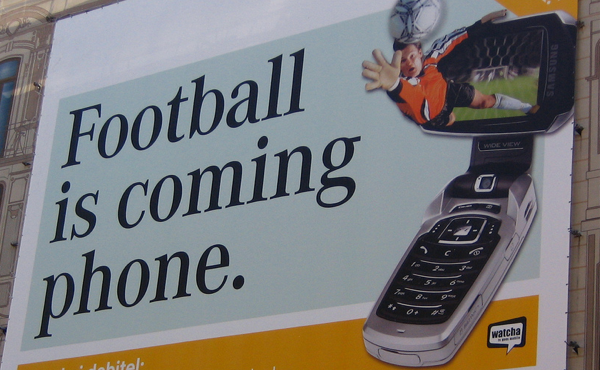Greedy providers. The mobile industry is all about squeezing as much money from the consumer as it can. But with AT&T’s move to a tiered pricing for data — and with others sure to follow — we could bear witness to long-lasting impacts that could not only punish consumers, but could destroy potential innovation for the entire industry.
We know how it works: as Verizon Wireless and AT&T continue raking in the profits, consumers are being forced to pay more for less, as usual. So now there is a new spin: pay less for less, which is exactly what AT&T is doing. But would this short-term price decrease be worth it? Maybe. Is the long-term harm worth it? Maybe not.
It depends on how willing mobile providers will be towards adjusting to increasing data consumption over time. Unfortunately, at least in this regard, history doesn’t help to paint a bright future.
AT&T Goes Tiered
AT&T made history recently by announcing plans to forego its $30 unlimited data offering for its mobile phones, wireless data, and, of course, the iPad on June 7, 2010, in favor of two new data plans. DataPlus offers 200 MB of data for $15 per month. DataPro, on the other hand, offers users 2 GB of data for $25 per month.
If you have previously had AT&T service with an unlimited data plan, you can rest assured that you will be able to keep your unlimited data. Even then, the new plans might be worth considering if you are sure you won’t go over the limits. It depends on how much longer you plan on remaining an AT&T customer.
DataPro’s 2 GB at $25 a month isn’t bad at all. For a five-dollar decrease on your bill you can get plenty of data that will fulfill the needs of even the most data hungry users. Furthermore, if you go over this limit, there is only a $10 charge per extra gigabyte of data used. That seems quite reasonable, especially considering the average data consumption of users these days.
DataPlus’s 200 MB plan at $15 looks great at first sight too, but only if you are sure to use little data. If you have one of those months where you happen to rely on your smartphone, iPad, or mobile Internet connection a bit more than expected and surpass the 200 MB limit, your $15 plan just went up to $30 (the same price you would have paid for unlimited) or more. Oddly enough, every 200 MB extra will add a $15 charge on your bill. This is incredibly disappointing, especially when considering that you pay only $10 for a gig of data with DataPro. To put things into perspective, if you used the same amount of data on DataPlus as allocated on the DataPro plan, you would pay $150 per month (this is an extreme example, but it just goes to show how awkward this pricing scheme is).
But then there is the $20 per month tethering fee that makes absolutely no sense at all. Not quite sure what AT&T’s reasoning for this is, but if you want to tether, you must pay extra. Oh, and you are still limited to your plan’s data cap. So there is not much else that can be said about this other than that it is ridiculous.
Of course, it is AT&T’s network, and they are free to charge what they please. Consumers are free to leave if they are not satisfied with these changes at the end of their contract. So those unsatisfied will hopefully speak with their wallets, but we are all well aware that our options as consumers for wireless are limited.
Unfortunately, it is very likely that Verizon Wireless will follow suit and begin a tiered data pricing structure as well. But it appears that Verizon Wireless will wait until they roll out their LTE network. When that happens, it won’t be long before the likes of Sprint, T-Mobile, and everyone else follows in their footsteps.
Harming Innovation
In principle, all this isn’t an issue, as consumers are used to getting their wallets raped by big corporations, but what is an issue is the impact that this could have on the mobile industry and the U.S.’s technological progress in general.
These data limits could severely hamper third-party development, overall innovation, and competition in the future.
For a concrete example, look no further than the 2010 World Cup. Many have been overjoyed with the ability to stream matches live on their mobile devices. But with these new plans offered by AT&T, this might prove costly to those planning on watching. It is these types of situations that are particularly frustrating.
Then throw in the all-you-can-eat content from YouTube and Pandora, some high-quality content from Hulu, a few HD movie streams, and some other forms of data that will chew up the bytes throughout the months, and then there is a big problem. I can’t even begin to imagine the bill shock that we are going to eventually hear about.
Are these users going to be aware of how much data they are using? Will they be notified if they approach the limit? I doubt it. It’s a big mess.
As a side note, this pricing scheme for data is made more target worthy in part because of the pricing for voice packages being unbelievably unfair. Seriously, who uses 450 minutes of voice minutes anymore? With the rise of VOIP services, why do the carriers continue to force these ridiculous voice pricing schemes down consumers’ throats?
Many Questions
So will these plans change to adapt to increased data consumption? Will mobile providers continue to charge the same rates five or more years from now when using tens of gigabytes per month on a smart phone, wireless Internet connection, or an iPad becomes common?
Will third parties be punished for these data limits? Third parties that are planning on creating services that use a lot of data might have to rethink their offerings, especially on mobile platforms. While offering these services on traditional broadband should be no problem, making the move to mobile might prove difficult if these data limits don’t expand with time.
Should consumers be punished for getting their money’s worth? Will consumers begin feeling like they can’t use their mobile devices as they please? Will all those iPad users who planned on using the iPad as a heavy-duty streaming device to consume content pay extra for that privilege? Will issues over net neutrality then come into play?
Will mobile providers ever get with the times, eliminate voice service for entirely data/VOIP service instead?
Finally, will providers ever offer a fair and reasonable flat-rate pricing scheme for data that could possibly resolve all these issues?
Greed
Make no doubt about it — American mobile providers want to move to a tiered structure for charging for data. Many countries throughout the world currently live with tiered pricing plans, so maybe us Americans are a bit spoiled (although, for a hundred dollars per for service on Verizon Wireless, I would really expect more value). If they want to move us to these plans, which is obviously going to happen now, then fine. But at least make it fair.
But data is supposed to getting cheaper. Not more expensive!
So why are users punished so much more heavily if they use a bit more data with DataPlus than DataPro? Does data used by DataPlus members cost AT&T any extra? No! So why should they be forced to pay a premium? Well, they shouldn’t! One customer is no different from another, particularly when you consider that AT&T is still only offering 3G data. After all, a byte of data is a byte of data. It just makes sense that a user should pay the same for that byte, no matter what plan the user is on.
Then again, look at Sprint: there is a $10 surcharge for 4G access to users who have purchased the HTC EVO 4G (and presumably all future 4G phones). But it makes no sense! These 4G network are 4 to 10 times cheaper to operate than traditional 3G networks. Essentially, Sprint is charging customers more for absolutely nothing! Sure, Sprint’s service is still cheaper than AT&T and Verizon — even with the $10 surcharge — but it makes me wonder how much extra we are going to pay Verizon and AT&T for their cheaper-to-operate networks in the future.
Ultimately, consumers are going to pay millions more for nothing more than a number change. Wireless providers are going to save millions of dollars. Yeah, this 3G to 4G move great… for mobile providers’ wallets.
In the end, however, I would just hate to think that consumers and developers are going to be punished because of these mobile providers’ greed. If prices don’t come down and data usage isn’t allowed to expand — especially with the development of new network technologies — I can’t see what good all this better technology is going to do for us in the long term. I just don’t see how things will get better without more competition or government regulation, both of which seem like remote possibilities.




Leave a Reply